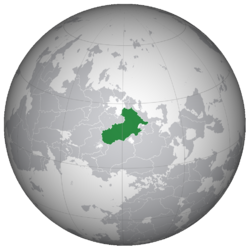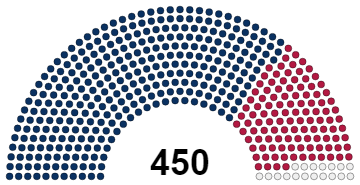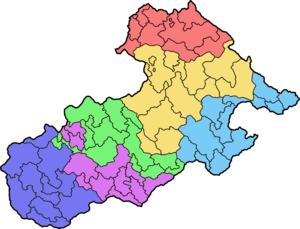Bakyern
This article is incomplete because it is pending further input from participants, or it is a work-in-progress by one author. Please comment on this article's talk page to share your input, comments and questions. Note: To contribute to this article, you may need to seek help from the author(s) of this page. |
Greater State of the Bakyernian Nation Rikestii dei Laakyar Natsionen | |
|---|---|
| Motto: En Folk, En Natsionen ("One People, One Nation") | |
| Anthem: Lovsaigen öv i Natsionen ("Hymn of a Nation") | |
 | |
| Capital | Kalvat |
| Official languages | Bakyernian |
| Ethnic groups | 81.2% Bakyernian 12.9% Kaampite 3.2% Tesänder 2.7% Other |
| Religion | TBA |
| Demonym(s) | Bakyernian • Bak |
| Government | Unitary Presidential Republic under a Dominant Party System |
• National President | Stafen Hansson Ovost |
• Deputy Presidents | Karl Norquist Adam Heilsein Johan Olso Blon |
• Rikthing Speaker | Thorbjörn Falljn |
| Legislature | Rikthing |
| Area | |
• | 2,058,726 km2 (794,879 sq mi) |
| Population | |
• 2020 census | |
• Density | 51.37/km2 (133.0/sq mi) |
| GDP (nominal) | estimate |
• Total | |
• Per capita | |
| Gini | 42.6 medium |
| HDI | 0.938 very high |
| Currency | Bakyernian Telding (T$) |
| Time zone | UTC-4 |
| Date format | dd.mm.yy |
| Driving side | right |
| Calling code | +4 |
| Internet TLD | .bk |
Bakyern (Bakyernian: Laakya) officially the Greater State of the Bakyernian Nation (Bakyernian: Rikestii dei Laakyar Natsionen) but also called Greater State of Bakyern (Bakyernian: Laakya Rikestii ( listen)) is a sovereign state located in the Thuadian continent, bordered by New Sebronia, Mustelarian Federation, Junterland, and Qazhshava. At an area of over 2 million square kilometers, Bakyern is one of the largest nations in Anteria and Thuadia by size alone. Some of the nation's largest cities are Kalvat which is the political and economic capital, Hasholm and Lidholsborn. The population of Bakyern ranges into 105 million, with a large population density in the Eastern regions and Rikbaltens such as Ostasvern and Trånes. Bakyern has been considered a diverse nation of religions and ethnic groups, especially in the Eastern Regions where many non-Bakyernian ethnic groups as well as ethnic groups from neighboring countries who spilled over reside.
The Bakyernian nominal gross domestic product comes to 5.697 Trillion mark in ACU, making it the wealthiest country in the Sekidean Union and one of the wealthiest countries in Thuadia and Anteria. With such a powerful economy, Bakyern maintains an active role in geopolitics - even with its inland sea which is the only coast it has. The defense of Bakyern relies on the Bakyernian Defense Force, with a total personnel number of 785,500. The Bakyernian economy is heavily service based. Bakyern's government is a unitary presidential state, with its internal politics being referred to as a dominant party system thanks to the power the National Unity Party has maintained since the creation of the Greater State in 1986. The Bakyernian economy is dominated by the Vaapsjen, who regularly have feuds with the government over disputes of ownership and claims. Bakyern is criticized for its near police state actions, usage of mass surveillance and the death penalty.
Government & Politics
Legislative System, Government, and Political Parties
Rikthing Greater State Meet | |
|---|---|
| Structure | |
 | |
Political groups |
|
The 450-member unicameral Rikthing holds and exercises supreme legislative authority over the nation. The Rikestiimat has the power to alter the constitution and ordinary laws. They may also dismiss cabinet members and override presidential vetoes. Acts done by the Rikestiimat are not reviewed judicially, as the constitutionality of new laws are reviewed by a constitutional committee (konstitalkomitt). A Rikestiimat term lasts four years, with elections taking place after those four years.
The current political system was created in 1986 following the creation of the Greater State and removal of the monarch. The National Unity Party has managed to maintain a dominant party system thanks to the majority in government they've maintained since 1986. Conservatism and Treigallism have been the majority ideologies in the political system. The Rikestiimat is divided between two coalitions, excluding the independents. These coalition are called the National Unity Coalition and Progressive Alliance. The National Unity Coalition is the current government, and is made out of conservative and right-wing political groups. The Progressive Alliance has worked as the current opposition, being made out of left-wing political groups and sometimes right-wing splinters that disagree with the National Unity Party's dominant status which many see as a violation to democracy. Before the removal of the monarch, conservative and right-wing groups still maintained dominance and a majority voter base.
The Ovost Cabinet is the 5th government of Bakyern, formed following Ovost's victory in the 2021 National Presidential Elections. The head of state is the Office of the National President. The President has three Deputy Presidents, which are ministers without portfolios. The Ovost Cabinet is made out of members from the National Unity Party and the Conservative People's Party.
Judicial System and Law
The judicial system of Bakyern is codified off a civil law system with cases being divided between courts. The general courts (allsmën hott) deal with criminal and civil cases while administrative courts (haldussen hott) maintain jurisdiction over cases of disputes. The courts in the court system are somewhat administrative level based - as criminal and civil cases are handed down to municipal or county courts (ort hott) while administrative courts are entirely municipally based, with municipal administrative courts having control of such cases.
The National Supreme Court of Bakyern is the highest court within the Bakyernian judicial system. The Supreme Court is made out of 10 Justices. For one Justice to be voted in, the President must submit a nominee to the Rikestiimat. A Justice vote will be called in, and the Rikestiimat will vote on the new nomination for the vacant Justice seat.
Bakyern maintains a crime rate that is above-average when compared to the rest of the Sekidean Union. The offense rate in Bakyern is low, but the most common offenses are sexual assault, assault, bribery, consumer fraud, burglary, and car theft. The homicide rate is above-average, but has been gradually decreasing over the years thanks to law enforcement. The homicide rate was at its highest in 2009.
The national law enforcement body is the National Police Authority. There are multiple government agencies responsible with law enforcement, even if it's dealing with different types of offenses and charges. The Bakyernian police have the National Operations Task Force as their national SWAT force. The National Security Service is an entity under control of the Chancellery of the Interior which has responsibilities of counter-terrorism, surveillance, and protecting sensitive information. In times of crisis such as martial law or lack of police personnel, the Bakyernian Defense Force can deploy Home Guard units to assist law enforcement or take over.
Regions
Bakyern is a unitary state divided into 6 Great Regions (Rikbalten) which serve as first-level administrative regions. Rikbaltens are later divided further into municipalities (Ortgaul). Every municipality has corresponding counties (Komunkap). Ortgauls have responsibilities regarding public service such as waste management, healthcare, education, emergency services and water utilities. Komunkaps have their own County Councils (Komunråd) which deal with local issues, disputes, and services such as fire protection. There are also Special Administrative Zones (Spasiellhaldusunvar) which serve as second-level administrative areas for large metropolitan areas. The Greater Kalvat Metropolitan Region falls under this category, being designated as a Special Administrative Zone under Ostasvern.
Elections for County Councils and Region commissions are held every four years in conjunction of national general elections. Regarding the formation and division of regions, during the High State of Bakyern's existence, first-level regions were divided into Realms (Rike). Following the abdication and removal of the monarch in 1986, Bakyern's administrative regions would not be reformed until January of 1987 with the Administrative Code Act of 1987 which reformed the Realms into the current form.
| Rikbalten Administrative Regions |
|---|
| Ostasvern |
| Trånes |
| Lerund |
| Varasun |
| Orisby |
| Leiborisk |
Cabinet
Foreign Policy and Relations
Military
Economy
Transportation and Infrastructure
Energy
Industry
Demographics
Religion
Language
Education
Largest Cities
Culture
Literature
Visual arts, designs and architecture
Television and Media




